Desert and Arctic Drilling
Bentec drilling rigs are used to drill for oil and gas all over the world, particularly in extreme climates. This is a challenge for engineers and materials.
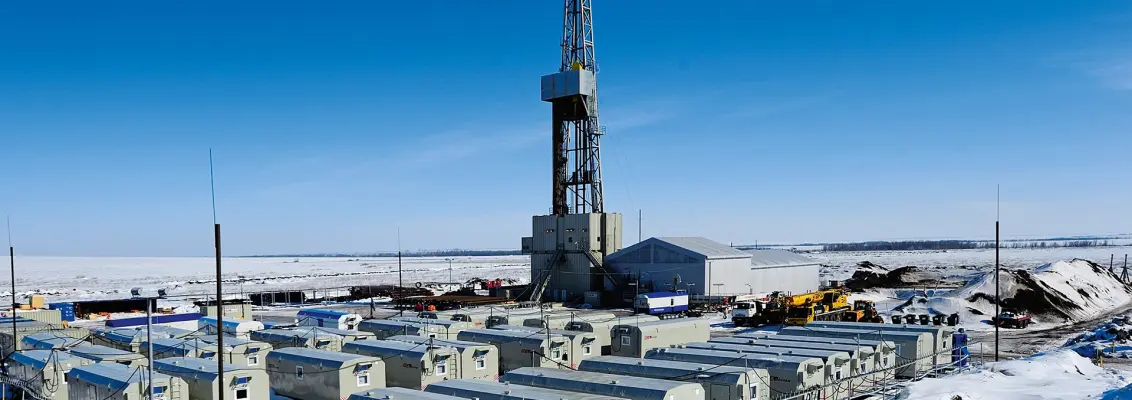
An icy wind blows across the seemingly endless expanse of Siberia. The double-digit sub-zero temperature makes everything appear frozen and lifeless. It’s not a place where you’d want to stay outside longer than necessary. A few thousand kilometres away, on the Arabian Peninsula, the opposite extreme prevails. Here, the sun beats down relentlessly on the hot desert sand; the temperature often tops 40 degrees Celsius (104 degrees Fahrenheit). However, it’s in these very regions that vast treasures lie dormant beneath the earth’s surface: huge reserves of oil and gas that are waiting to be extracted to meet the world’s insatiable demand for energy. The climate is not only tough for humans; machines too have to cope with the extreme environmental conditions. The drilling rigs used to extract these resources are truly put to the test by both the weather and the complex task.
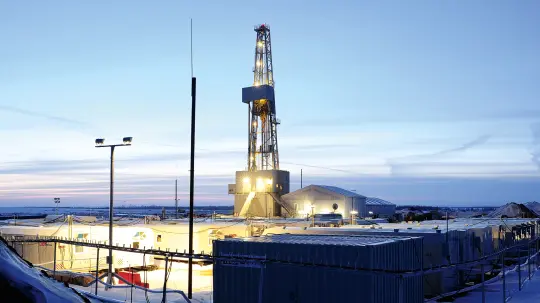
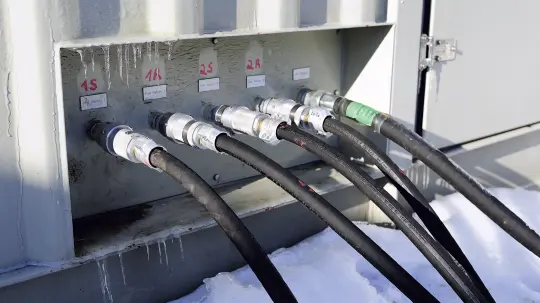
EVERY COMPONENT COUNTS
In temperate Germany, or to be more precise, in Bad Bentheim, Lower Saxony, it’s Christian Klein’s job to take up the challenges posed by these extreme conditions. He works for Bentec GmbH, a medium-sized company that designs and builds deep drilling rigs for oil, gas, and geothermal wells. “Our drilling rigs are used around the world. In principle, you’ll find them in every climate zone, but mostly in Russia and the Middle East,” says Klein, who is responsible for the installation and commissioning of the drilling rigs. Bentec supplies customers with ready-made rigs and in doing so, takes care of all the other drilling equipment components, from the control cabinets to the steel framework. According to Klein: “We have to be certain that every single component can withstand the extreme weather conditions.” Given the currently low oil and gas prices, the company’s customers are under considerable cost pressure. “Every malfunction costs money. With our innovative products, we want to make sure that this never occurs,” stresses Klein.
HIGH TECH ON WHEELS
A Bentec drilling rig is a complex object. At its heart is the derrick with the top drive that turns the drill string. The various sensors fitted to the end of this drill string send important information to the operator in the rig’s control-and-command centre. It also comprises pumps, draw-works and other mechanical components, not to mention diverse superstructures. As all oil and gas wells eventually dry up, the complete drilling rig is designed to be mobile so that it can be easily transported to the next location to continue working there. In desert regions, the rig is transported on wheels; in arctic areas, via rails. “We need large amounts of cable for the sophisticated control system. This starts with the central power supply from the generator and goes through to the multitude of cabling in the enclosure containing control cabinets, which regulate the control system and power distribution,” explains Klein.
Some of these cables are outside and hence exposed to the elements the whole day: sun and desert storms, or snow and ice. Therefore, they must not only be able to cope with high mechanical stresses but also a spectrum of temperatures ranging from minus 45 to plus 80 degrees Celsius (-49 to +176 degrees Fahrenheit). In addition, they should be UV- and oil-resistant. “We always keep a stock of cables, so long shelf life is important as well. A cable that is already brittle after six months is of no use to us,” says Klein. That’s why Bentec has been procuring its standard cables from HELUKABEL for many years. “We know we can rely on the excellent quality and the good service.”
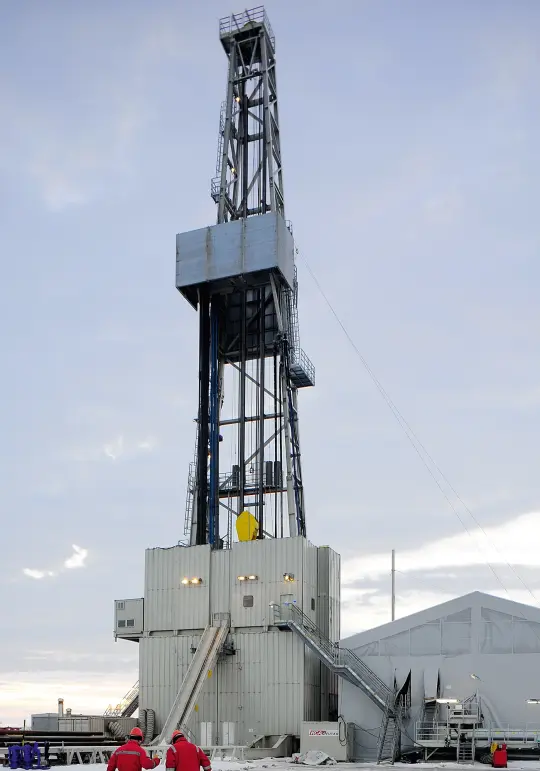
EXTREME FORCES
Standard cables however are not sufficient for some applications in the rig, such as drilling engineering. Here, the demands on the power supply and data transmission cables are particularly high. With a force exceeding 1,000 hp, the top drive gradually turns the drill string into the ground. The latter travels up and down the drilling rig up to a hundred times a day. While doing so, the cables are subjected to great stresses, not only through rotation, but each time they are reeled in and out. “A cable capable of dealing with such stresses is not so easy to come by. That’s why we contacted HELUKABEL,” says Klein.
COMPLEX, HIGH-TECH CABLE
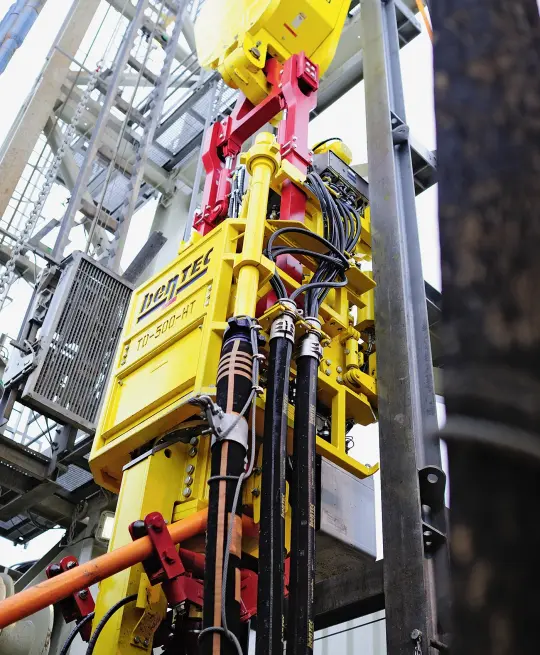
When Hanss Bruss, key account manager for custom cables at HELUKABEL first heard about these requirements, he knew this wasn‘t going to be an easy task. “There are very large currents flowing here. The single conductor for the main power supply alone has a cross section of 300 square millimetres (600 kcmil). On top of this are up to 45 wires for the sensor and control system signals. At the same time, the cable has to remain flexible and withstand torsional movements.
Bruss and his R&D colleagues at HELUKABEL’s Windsbach plant didn’t have to start from scratch though. “We’ve been able to gain a lot of experience from the torsional movements in wind power plants, and regarding alternating bending stress, we were able to draw on our crane construction know-how. What we needed to do, was to satisfy both requirements and select materials capable of withstanding the extreme environmental conditions,” explains Bruss. During development, the engineers paid attention to even the smallest detail. What would be the best way to strand the wires so they don’t break? How should they be bundled to keep the cable flexible? Which material would be suitable for the outer sheath? “The key here was the interaction among all components. Designing the support braiding was particularly challenging. On the one hand, it couldn’t be too thick as this would impair the cable’s flexibility. On the other, it had to provide a certain stability,” explains Bruss. Once the cable’s structure had been defined, diverse material and stress tests took place. “During the entire development, we were in very close communication with Bentec,” he recalls.
SPECIAL ORDER COMPLETED
Klein in Bad Bentheim is very satisfied with the result. He says: “We were present during testing, and performance lived up to expectation. We can trust the materials and are able to kill two birds with one stone as the high-tech cable can be used in both the desert and arctic regions.”
THE DRILLING SPECIALISTS
Who: Bentec GmbH, in Bad Bentheim, approximately 600 employees worldwide.
What: Manufacturer of drilling rigs for the gas and oil mining industry. The company develops all the main components itself and offers special rig solutions for both arctic and desert regions, as well as for applications in more temperate latitudes.
